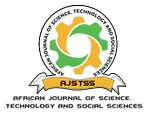Tradition versus change in a time of pandemic
: a reading of Meja Mwangi’s the last plague
DOI:
https://doi.org/10.58506/ajstss.v1i1.53Keywords:
HIV/AIDS, Pandemic, Plaque, ConfrontationAbstract
This paper explores the varied and complex ways in which allegiance to traditional beliefs and practices impacts a peoples’ health in time of pandemic. Using Meja Mwangi’s The Last Plague as a launching pad, I seek to examine the role of literature in creating awareness during moments of crisis within a society. This paper narrows down to the complexities and contradictions that come into play in the confrontation between indigenous African traditions and the H.I.V A.I.D.S pandemic as portrayed in Meja Mwangi’s novel, The Last Plague. The paper draws from the sociological literary theory and especially the views of Ngugi wa Thiong’o on the relationship between literature and society. On one hand the paper engages with how the author portrays the impact of the plague on the socio-cultural norms, while on the other hand it addresses the inflexibility of the traditions and cultural beliefs and practices as an impediment to the struggle against the spread of the HI.V pandemic as presented in the novel.


